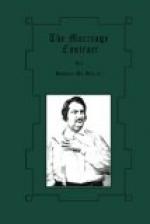Among these necessities was that of confiding the truth to her notary, for whom she sent in the morning as soon as she rose. She was forced to reveal to him a secret defaulting she had never been willing to admit to herself, for she had steadily advanced to the abyss, relying on some chance accident, which never happened, to relieve her. There rose in her soul a feeling against Paul, that was neither dislike, nor aversion, nor anything, as yet, unkind; but he was the cause of this crisis; the opposing party in this secret suit; he became, without knowing it, an innocent enemy she was forced to conquer. What human being did ever yet love his or her dupe? Compelled to deceive and trick him if she could, the Spanish woman resolved, like other women, to put her whole force of character into the struggle, the dishonor of which could be absolved by victory only.
In the stillness of the night she excused her conduct to her own mind by a tissue of arguments in which her pride predominated. Natalie had shared the benefit of her extravagance. There was not a single base or ignoble motive in what she had done. She was no accountant, but was that a crime, a delinquency? A man was only too lucky to obtain a wife like Natalie without a penny. Such a treasure bestowed upon him might surely release her from a guardianship account. How many men had bought the women they loved by greater sacrifices? Why should a man do less for a wife than for a mistress? Besides, Paul was a nullity, a man of no force, incapable; she would spend the best resources of her mind upon him and open to him a fine career; he should owe his future power and position to her influence; in that way she could pay her debt. He would indeed be a fool to refuse such a future; and for what? a few paltry thousands, more or less. He would be infamous if he withdrew for such a reason.
“But,” she added, to herself, “if the negotiation does not succeed at once, I shall leave Bordeaux. I can still find a good marriage for Natalie by investing the proceeds of what is left, house and diamonds and furniture,—keeping only a small income for myself.”
When a strong soul constructs a way of ultimate escape,—as Richelieu did at Brouage,—and holds in reserve a vigorous end, the resolution becomes a lever which strengthens its immediate way. The thought of this finale in case of failure comforted Madame Evangelista, who fell asleep with all the more confidence as she remembered her assistance in the coming duel.




